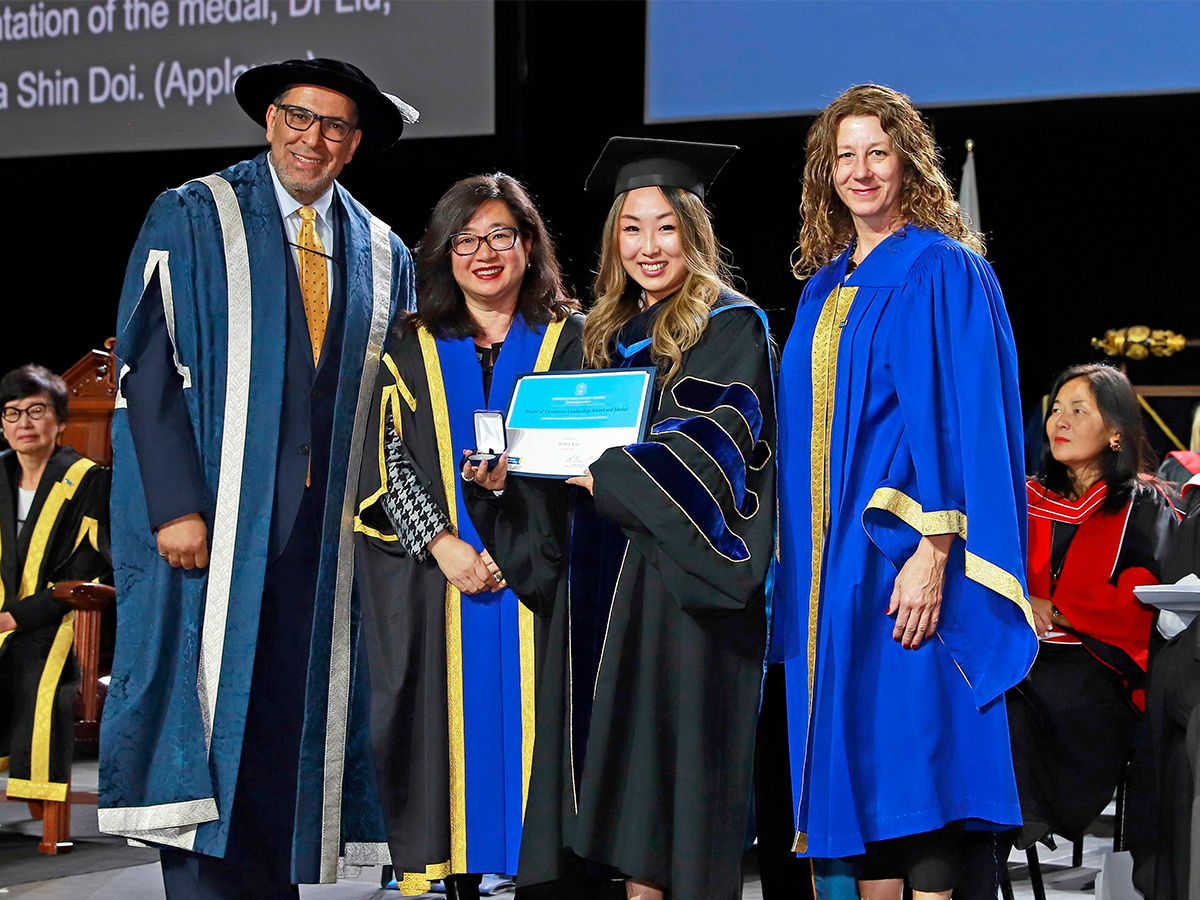Gold medal in resiliency

Jenny Liu receives two top medals at fall Convocation. Photo: LifeTouch
Jenny Liu has more than proven she’s resilient.
Graduating from Ryerson University’s Faculty of Arts with a PhD in psychology, Liu is capping off her academic career with a series of profound achievements.
First, she was selected to receive Ryerson University’s Gold Medal, the university’s highest honour. It’s awarded to students with outstanding academic achievement and exceptional involvement in the university, their profession, and their community.
Liu also received the Board of Governors Leadership Award and Medal. She is also the creator of a mental health app, which helps people gauge their resilience and offers tips on how to cope with stress.
Below, learn more about Liu and what receiving Ryerson’s Gold Medal honour means to her.
Q&A:
- What does receiving the gold medal mean to you?
Receiving the gold medal is an indication that my work is making a meaningful impact in the community. I am incredibly honoured and grateful for the recognition. More importantly, I share this recognition with my mentors, collaborators, friends and family who have contributed to my success, and provided unconditional support during my journey.
- What advice would you give students entering their first year?
Everyone can feel like an imposter on the first day of school. Give yourself the space to be afraid, and take things day by day. Our fears, anxieties and stresses can be helpful to uncover our values. We can use them to identify the things that are important to us, and use them to motivate us in our own journeys.
- Do you have any favourite classes/teachers, and what made them stand out?
I would not be here if not for the incredible mentors and professors at Ryerson University.
My doctoral supervisor, Dr. Kristin Vickers, provided me with solid foundations in research, and her unwavering support gave me the space needed to pursue multiple research interests and produce my best work.
Dr. Maureen Reed has been an advisor and mentor over the years, and I have come to rely on her incredible insights and tough love when needed.
Dr. Josephine Wong has been a champion of social justice and advocacy, and a role model and mentor in research and in life.
They have all pushed me to think about the “why should we care” aspect of conducting meaningful research and community engagement, and I am incredibly fortunate to have them in my life.
- How did Ryerson support you during your time here?
Ryerson University has experienced and continues to experience tremendous growth. Paralleling this growth is the expanding supports available to students and scholars. I have come to rely on Ryerson’s resources such as the Office of Vice-President, Research and Innovations for promoting my research and introducing me to important opportunities and collaborations.
My day-to-day research activities are supported by the cutting-edge technology and infrastructure available to me as a student from the Department of Psychology and the Institute for Stress and Wellbeing Research.
Finally, within the Ryerson community and within the Psychology Department, a culture of collaboration from members with diverse expertise have made interdisciplinary work possible and an invaluable part of my growth and development.
5. What has been your proudest accomplishment?
My proudest moments are when I feel I have made a difference. A few come to mind.
The first was hosting our Chinese colleagues here at Ryerson as part of an international research team initiative to promote mental health between China and Canada. Through this collaboration, which was done through the Global Alliance for Chronic Disease, we engaged in cross-cultural and interdisciplinary dialogue to discuss how we can better tackle the mental health challenges of university students.
Also memorable was making my resilience research accessible by developing and publishing a free digital application (MSMR) and sharing this research with the Ministers of Finance and Science and Sport at the Dimensions program launch at Ryerson University.
Representing Ryerson at the Ontario Centre of Excellence Discovery Conference, and finding out one of my mentees was accepted into the graduate program in psychology are also stand-out moments.
6. What are your future plans?
I began my postdoctoral fellowship in psychiatry at Toronto Western Hospital within University Health Network. In my role, I will continue to conduct research on mental health and wellbeing, and explore opportunities for community engagement and collaborations. I am incredibly grateful for my time here at Ryerson University, and I look forward to applying my experiences, skills and knowledge in the next chapters of my life.